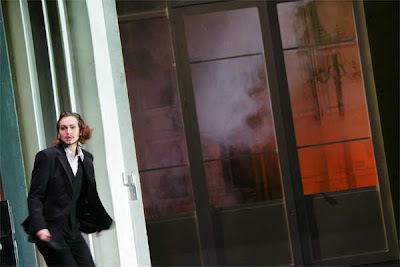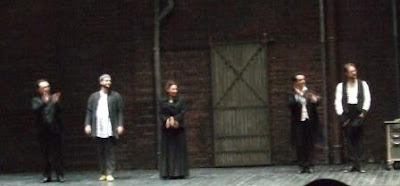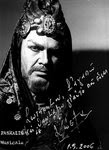"Pure operatic bliss" is when you leave an Opera House with a wide smile on your face, have post-performance dinner with the same wide smile on your face, go to bed with the same wide smile on your face and when you wake up in the morning (probably with the same ol' wide smile on your face) the first thing that comes to your mind is
"Sigh, wish I could live that again".
Doesn't happen often, but when it does, you know that the experience is gonna keep you up & goin' (and without even the need of watching anything else) for a few more months.
Apparently, the 5th of December, my first live Die Tote Stadt at the Oper Frankfurt, was (for me and for about 1.500 other people) a memorable night.
The protagonist was with no doubt Sebastian Weigle and the Frankfurter Opern-und Museumsorchester whose perfect, overwhelming, splendid, awesome (somebody stop me, please) sound sent me to an intergalactic trip for more than 2 hours.


The production by Anselm Weber was dark, industrial, hi-tech, ballancing between reality and fantasy in a cinematographic manner, using some stunning video projections, and being assisted ideally by the set of Katja Haß, the costumes of Bettina Walter and the lighting of Frank Keller.


Klaus Florian Vogt's angelic, boyish voice was not what one would expect for the part of Paul, however I found his adaptation to this heavier role pretty remarkable and was amazed by how well this light, but perfectly projected voice, was capable of cutting through the heaviest orchestration of Korngold's score and even more amazed by the fact that even when showing his back to the audience, the voice was still projected almost unaltered. I'm pretty sure Vogt, who became famous as a heldentenor is more of a Tamino than a Lohengrin but one has to admit that he's a great singer.

Tatiana Pavlovskaya's voice kept bringing me remembrances of a young Eva Marton. The voice was big in volume and full in body but at times off mark (esp. at the high notes), and the blurry German was not among her main strengths. Nevertheless Marie/Marietta is a role of Brunhildian proportions and Pavlovskaya deserves a medal for bringing Rodenbach/Schott/Korngold's heroine to life with a handsome stage presence and a powerful, almost invincible approach of the partitura.

Michael Nagy was a good Frank, but the Pierrot lied in Act II sounded tired and unstable, Hedwig Fassbender was a perfect Brigitta, as superb were all supporting roles (Ryberg, Carlstedt, Prégardien etc).


The curtain calls were triumphant, with Vogt and Weigle receiving the most enthusiastic applause of the audience, mine as well.
The premiere of this production was broadcast live,
but it will be a pity if it doesn't find it's way to the DVD market.
Listen to Klaus Florian Vogt as Paul in Die Tote Stadt's splendid finale.
Curtain calls:







 Auf Wiedersehen Frankfurt!
Auf Wiedersehen Frankfurt!
"Sigh, wish I could live that again".
Doesn't happen often, but when it does, you know that the experience is gonna keep you up & goin' (and without even the need of watching anything else) for a few more months.
Apparently, the 5th of December, my first live Die Tote Stadt at the Oper Frankfurt, was (for me and for about 1.500 other people) a memorable night.
The protagonist was with no doubt Sebastian Weigle and the Frankfurter Opern-und Museumsorchester whose perfect, overwhelming, splendid, awesome (somebody stop me, please) sound sent me to an intergalactic trip for more than 2 hours.


The production by Anselm Weber was dark, industrial, hi-tech, ballancing between reality and fantasy in a cinematographic manner, using some stunning video projections, and being assisted ideally by the set of Katja Haß, the costumes of Bettina Walter and the lighting of Frank Keller.


Klaus Florian Vogt's angelic, boyish voice was not what one would expect for the part of Paul, however I found his adaptation to this heavier role pretty remarkable and was amazed by how well this light, but perfectly projected voice, was capable of cutting through the heaviest orchestration of Korngold's score and even more amazed by the fact that even when showing his back to the audience, the voice was still projected almost unaltered. I'm pretty sure Vogt, who became famous as a heldentenor is more of a Tamino than a Lohengrin but one has to admit that he's a great singer.

Tatiana Pavlovskaya's voice kept bringing me remembrances of a young Eva Marton. The voice was big in volume and full in body but at times off mark (esp. at the high notes), and the blurry German was not among her main strengths. Nevertheless Marie/Marietta is a role of Brunhildian proportions and Pavlovskaya deserves a medal for bringing Rodenbach/Schott/Korngold's heroine to life with a handsome stage presence and a powerful, almost invincible approach of the partitura.

Michael Nagy was a good Frank, but the Pierrot lied in Act II sounded tired and unstable, Hedwig Fassbender was a perfect Brigitta, as superb were all supporting roles (Ryberg, Carlstedt, Prégardien etc).


The curtain calls were triumphant, with Vogt and Weigle receiving the most enthusiastic applause of the audience, mine as well.
The premiere of this production was broadcast live,
but it will be a pity if it doesn't find it's way to the DVD market.
Listen to Klaus Florian Vogt as Paul in Die Tote Stadt's splendid finale.
Curtain calls:







 Auf Wiedersehen Frankfurt!
Auf Wiedersehen Frankfurt!



























































.jpg)




















